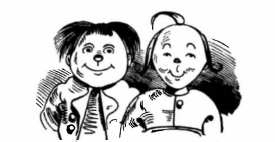rhyme is in the air
[see also a more recent post here. mw, august 8 2010]
Kate McCurdy and I are currently working on cross-linguistic differences in constraints on rhyme. Here’s a draft of a recent paper that proposes an explanation for why ‘identity’ rhyme is considered a satisfactory rhyme in French but not in English. We relate this difference to the way information structure affects prosody in those languages, drawing on an observation by Edwin Williams that suggests that focus- and givenness marking in English has been ‘overgeneralized’ to phonological identity in such a way that sentences can sound infelicitous just because they end with phonological identical material.
A rhyme is usually defined as a pair of words that are identical from the last accented vowel to the end of the word or line (wear/bear). Identity rhyme (or: rime très riche) is a rhyme pair in which the phonological material from the accented syllable including the onset until the end of the word or line are identical (to bear/a bear). A special case are homophones, in which the entire last words containing the last accented vowel of the line are identical. In our study we focus on rhymes that are phonologically identical but differ in meaning, because rhymes that are identical in phonology and meaning might be bad because they’re repetitious. Identity rhyme is different from mere ‘rime riche,’ in which an additional consonant is shared, but the rhymes are not fully identical (train, crane). While identity rhymes are considered poor and are rare in languages such as English or German, rime riche is quite well attested. In some other languages, French is one example, identity rhymes are ubiquitous. Of course, it could well be that this is an accidental differences stemming from the different poetic traditions in these languages, but our working hypothesis is that there is more to this.
A simple illustration of the cross-linguistic differences: One way we try to compare usage of rhyme across languages is to look translations of rhymed poetry. We have been collecting translations of the illustrated children’s book ‘Max & Moritz’ by Wilhelm Busch (first published in German in 1865).

